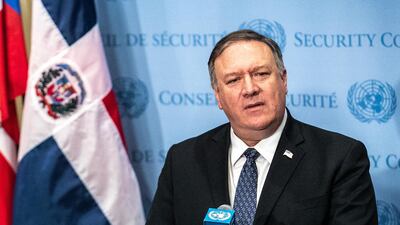Though neither of the organisers has confirmed details of the guest list, up to 70 countries were invited to a Warsaw summit on Iran in February.
The "Ministerial to Promote a Future of Peace and Security in the Middle East" is set for February 13-14 at the instigation of the US and Poland. During a briefing about the event on Monday, officials from both sides were keen to stress the discussion would tackle many of the challenges facing the region.
Officials have sought to dismiss accusations from Tehran that the meeting is an anti-Iran conference. The Iranian foreign ministry has dismissed the meeting as a “hostile act” and summoned Polish diplomats for a dressing down.
Federica Mogherini, the EU high representative for foreign affairs, pleaded previous commitments when confirming she would not attend. The British foreign secretary Jeremy Hunt agreed to show up after securing a promise from Mike Pompeo, the US Secretary of State, that a meeting of the Quad group of countries on Yemen would meet on the sidelines. Germany and France are still to announce the level of representation they will send to Warsaw.
A senior US official told reporters that Iran would not be the sole focus of the conference.
"It's important to underscore that this is not an anti-Iran meeting or coalition-building exercise," the official said."From the start, this ministerial has been focused on exploring a range of issues important to the region's security and prosperity."
"We are going to discuss Iran because it’s not possible to have any conversation about the Middle East without having some reference to Iran," he added. "But that doesn’t make it an Iran ministerial, and it never has.
"We have a very comprehensive agenda. It’s been that way from the beginning. We’re very pleased with the responses we’ve been getting from around the world."
Washington is seeking the establishment of working groups in the aftermath of the Warsaw discussions that would follow-up on policy priorities identified by the participants. "We want to get some momentum coming out of Warsaw," he said.
__________
Read more:
Mike Pompeo: Barack Obama is to blame for Iran's expansion
Analysis: Cairo speech drives home Iran as 'common enemy' message
____________
The official said that the conference would discuss the crises in Syria and Yemen as well as missile proliferation, cyber issues, human rights and refugees, with working groups then tasked with following up.
"What happens in the Middle East is relevant to countries around the world," he said.
Mr Pompeo has praised the get-together as an opportunity for ministers from around the world to initiate further diplomatic activity through working groups. It comes almost as Iran marks 40 years since its Islamic revolution and after the United States reimposed sweeping sanctions on the country.
It is hard to shake the perception that Poland is an unlikely venue for an impromptu high-level gathering on the woes of the region.
“Poland is not an obvious choice as the location for the Middle East conference, to say the least. The country’s political and economic stakes in Iran are not high, and its record of engagement in the region is rather moderate,” the Polish commentator Piotr Buras wrote for the European Council on Foreign Affairs in a research note. "Warsaw is the capital of a central European EU and NATO member state, not a neutral place like Geneva, Helsinki, or Vienna where difficult multilateral negotiations usually take place. The assumption that Poland’s interest in holding the controversial meeting lies primarily in its bid for a special partnership with the US is thus not far-fetched."


